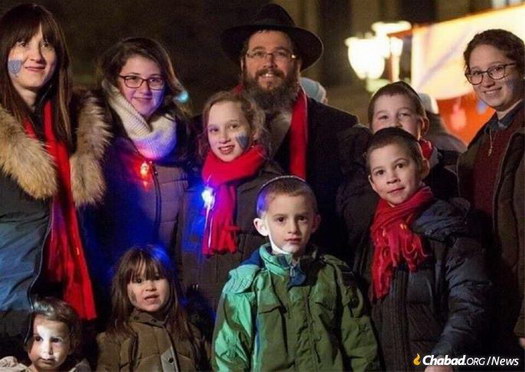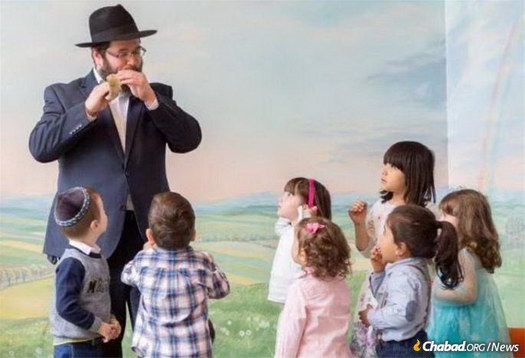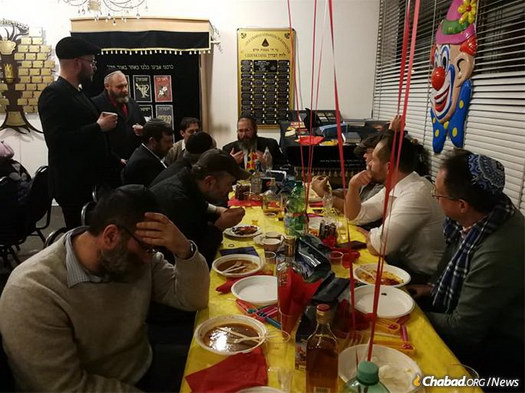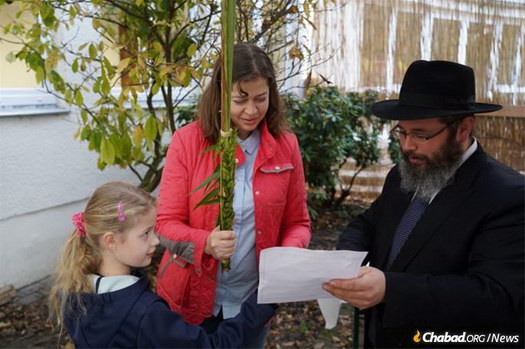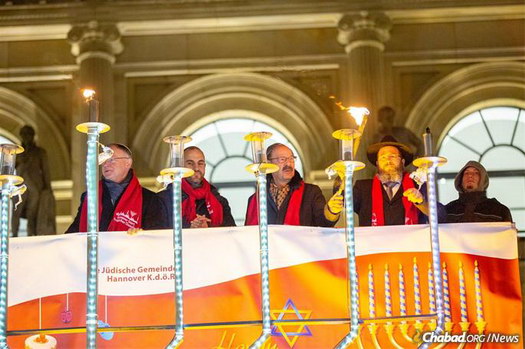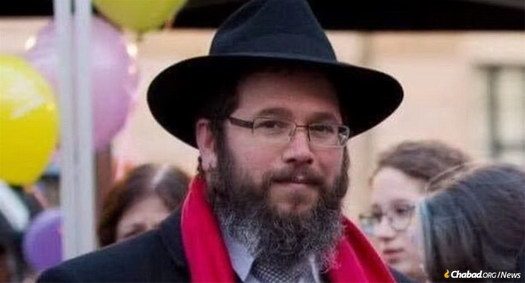
Obituary: Rabbi Binyamin Wolff, 43, Devoted Rabbi of Hanover, Germany
by Dovid Margolin – chabad.org
Rabbi Binyamin Wolff was dedicated to his family, his work and the Jews of Hanover, Germany. Fifteen years ago, the rabbi and his wife, Sterni, arrived in the capital of Lower Saxony and established Chabad-Lubavitch of Hanover. In a short time, the passionate and dynamic couple transformed the city’s Jewish landscape and the lives of countless individuals.
On Friday evening, April 24, not long after the onset of Shabbat, Rabbi Wolff tragically passed away at the age of 43. He left behind his wife, eight children between the ages of four and 19, and thousands of family members, friends, students, congregants and admirers.
News of the passing shocked the entire spectrum of the German Jewish community.
“With a broken heart and deep pain, we learned of the passing of our dear colleague and partner Rabbi Binyamin Wolff,” Chabad of Germany announced in a German and Hebrew statement released after the conclusion of Shabbat. “ … [H]e was taken at the height of his strength and activities; his passing is a terrible loss for German Jewry at large and the Jews of Hanover in particular.”
The Central Council of Jews in Germany and Israel’s embassy in Berlin also both released statements mourning the young rabbi’s untimely passing.
But nowhere was the calamity felt more than in Hanover itself, a city of a half-million in northern Germany where Wolff served as the lone rabbi for its 5,000 Jews.
“It’s a difficult day for all of us,” said Dr. Peter (Pinchas) Kamenetski, a Hanover physician who first met Wolff not long after the rabbi’s arrival in the city in 2005. “I lost my father a few years ago. Today, I felt like I lost my second father.”
Friends and strangers from throughout the city, country and world had prayed and performed extra good deeds in the hopes of Wolff’s recovery since his hospitalization a few weeks ago. The immediate aftermath of his passing has seen an outpouring of tributes on social media, email and myriad other forms of communication. Each one testifies to Wolff’s ever-present smile and selfless dedication to each person he came in contact with—no matter social standing, religious observance, age or anything else.
“He really loved all people,” said an emotional Kamenetski, who served as the Wolff family’s medical liaison in the last few trying weeks. “All sorts came to him. Some could be downright rude, or provocative, and you saw that he still loved them. He considered every Jew priceless.”
“He was here for us all 24 hours a day,” added Kamenetski’s wife, Rivkah Chaya. “We got used to that. Now who are we going to call?”
Contrary to preliminary reports, the cause of death, according to Rabbi Yehuda Tiechtal, rabbi of the Berlin Jewish community and director of Chabad in the German capital, was complications from pneumonia and not COVID-19.
Jewish tradition calls for the deceased to be laid to rest as soon as possible, and with the assistance of Hanover’s Mayor Belit Onay, Wolff’s emotional funeral was able to take place on Sunday afternoon. A handful of masked rabbis and mourners participated in person while some 15,000 more attended via a Zoom feed that was simultaneously broadcast online, the searing image of Sterni Wolff and the Wolff children rending their garments in mourning beamed around the world.
Wolff, known far and wide as “Benny,” was buried in Hanover, the city where he served as an emissary of the Rebbe—Rabbi Menachem M. Schneerson, of righteous memory—and to which he had moved with every intention of remaining until the coming of Moshiach, the righteous redeemer.
“After Shabbat, when people found out the news, one of the first questions in Hanover was: Are they staying?” said Teichtal. “You can see the Wolff family’s answer: They are here to stay. This is absolutely a statement of what Benny wanted and a testament to who his wife and family are.”
‘He Was Always Smiling’
Binyamin Wolff was born in Kiryat Malachi, Israel, on Sept. 12, 1976, to Rabbi Meni and Feige Wolff, among the first to settle in the southern city’s new Nachalat Har Chabad neighborhood. Wolff, whose father serves as a director of the Kehot Publication Society in Israel, studied at Chabad yeshivahs in Nachalat Har Chabad, Kiryat Gat and then Kfar Chabad before spending a year in New York, where he pursued his studies at the Central Lubavitch Yeshiva at 770 Eastern Parkway and the small study hall adjacent to the Ohel, the Rebbe’s resting place in the Cambria Heights section of Queens, N.Y.
With a passion for interacting with Jews from all walks of life, Wolff took his studies abroad, spending time in Milan, Italy, and then studying for his rabbinic ordination in Houston, Texas, where he was able to combine the Torah learning with community work.
“There was no one Benny couldn’t get along with,” recalled Rabbi Shmuel Gopin, today director of Chabad of Midtown Miami, who spent time with Wolff in New York and Houston and then six months working with Israeli backpackers out of Chabad of Bangkok in Thailand. “He was just pleasant to everyone, a real mensch.”
In the short time since his friend’s passing, one thing keeps coming to Gopin’s mind.
“His smile,” Gopin said. “That’s what everyone is talking about now, and it’s really true. He was always smiling.”
In 2000, Wolff married Sterni Greenberg, and not long thereafter the couple set out for their first posting in Odessa, Ukraine, joining Sterni’s sister and brother-in-law, Chaya and Rabbi Avraham Wolff, co-directors of Chabad of Odessa. There, Binyamin directed the seaside city’s branch of the Gan Israel summer camp, among other duties, and the couple learned Russian.
In 2005, the couple, by now with three young children in tow, moved to Hanover, Germany, where they established a Chabad center for all of the city’s Jews, among them a massive influx of Russian-speaking Jews from the former Soviet Union.
Hanover did not come without its own challenges. Not everyone in the city felt the existing Jewish community needed this new young couple.
That’s where Wolff’s modesty, authentically warm demeanor and disarming smile came in.
‘Built Bridges With Everyone’
Kamenetski immigrated from St. Petersburg, Russia, to Germany in 1992, and has lived in Hanover since 1993. He remembered the day his wife called him to say she had met a young rabbi on the streets of the German city. Both were born and raised in the Communist Soviet Union, where they learned nothing about their Jewish heritage and had not engaged much with it in Germany, either.
“Honestly, the idea of going to meet with a rabbi was for me a very strange idea,” said Kamenetski.
But when Wolff invited the couple to his home, they decided to go and immediately felt comfortable in the warm atmosphere. They kept coming back.
“He never preached, he never demanded or pressured” people to become more observant, said Kamenetski. “He always somehow pointed the way. He knew exactly when to look away and when to explore further.”
At the age of 43, Kamenetski decided to get a brit milah. Rabbi Wolff arranged for a mohel to travel to Hanover and served as the sandek. Dr. Kamenetski chose the Jewish name Pinchas.
By this time, the doctor was driving to synagogue for a year, becoming more and more of a regular. That’s when Wolff broached the topic with him.
“He said, very gently, ‘By now, I don’t think you should be driving on Shabbat,’” recalled Kamenetski. “And I thought: ‘You know what, you’re right.’ ”
A year-and-a-half after his circumcision, the Kamenetskis had a chuppah, a Jewish wedding ceremony, which the Wolffs likewise helped arrange, with the rabbi officiating. It was the same thing with kosher, tefillin and other core aspects of Jewish life. Wolff never pressured but led, always with warmth, always with a smile.
“I can honestly say that he wasn’t only my rabbi but he was my friend,” said Kamenetski. “A real friend.”
“He successfully built bridges with everyone in the city,” noted Teichtal. “Benny was someone who held strong to his standards, but it was never my-way-or-the-highway.”
Over time, Wolff formed a strong relationship with the local Jüdische Gemeinde (Jewish community) and all the groups of Jews who form Germany’s culturally diverse Jewish community.
Addressing a Russian-language Zoom gathering in Wolff’s memory for the Hanover community, Rabbi Berel Lazar—Russia’s chief rabbi and head Chabad emissary—recalled visiting Hanover seven years ago at Wolff’s invitation to participate in the ceremonial conclusion of a new Torah scroll for the synagogue. Lazar agreed to fly in for a day and was amazed by how packed the schedule drawn up by the young Wolff was.
“We met with the mayor and head of the community, we met with the German Jews, the Russian-speaking Jews and the Bukharian Jews, then with this person and that person, and this was all besides for the actual program,” said Lazar. “I witnessed how he interacted with every single person … he greeted them like they were his best friend whom he hadn’t seen in 10 years … I’d never seen that before—a young rabbi who was able to find common ground with everyone. It was uncanny.”
But it wasn’t just that.
“He really did love everyone, Benny wasn’t making a show,” said Lazar. “Each Jew in his city really was his friend.”
“That’s how he and his wife were able to transform the city,” added Teichtal, speaking on the phone as he drove the three hours back to Berlin. “He impacted the city not just in a collective manner, but in a personal way.”
There were the big things, like the massive annual Chanukah menorah-lighting in Opera Square in the city’s historic center. And there were the small things.
“One Passover [about a decade ago], we decided we would go all the way and [kosher] our home correctly,” Avraham, a community member, recalled on the Hanover Zoom gathering, which began shortly after the rabbi’s funeral. “Binyamin explained to us all the details, and we followed it all. Literally a day before Passover, I realized we couldn’t kosher the pans, and I forgot to buy new ones for this year. I called up Binyamin and asked him what to do.”
The rabbi told Avraham not to worry. An hour later, the rabbi arrived at the family’s home with brand-new pans.
“We were in shock,” said Avraham. “When he left I told my wife: ‘Where else is there a rabbi who right before Passover will go out and buy, and then deliver, brand-new pans to your house?’ ”
Rivka Chaya Kamenetski experienced something similar. She works with her husband at his clinic, and there were times when they were leaving the house at 6 a.m., but their sitter for their daughter had fallen through.
“Rabbi Wolff told me ‘Just bring her over to our house, my children will be up, don’t worry,’ ” recalled Rivka Chaya. “My daughter grew up at Chabad; she was basically born there. But the Wolffs, they were always there for us.”
‘The Community Needs to Live On’
Wolff was recalled as someone who was supremely dedicated to what he saw as the privilege of being the Rebbe’s emissary to Hanover.
“He worked so much, he never vacationed,” said Rabbi Zalman Wishedski, co-director of Chabad of Basel, Switzerland, six hours from Hanover. “He never stopped; it was like Benny didn’t want to lose even one day.”
While Rivka Chaya Kamenetski cherishes the rare Sunday outings her family went on with the Wolffs to the German countryside, noting that the rabbi visibly enjoyed spending time with his family and the great outdoors, his schedule didn’t allow him to do it much.
“I don’t know how much he slept,” she said. “He always had more to do for the Jews of Hanover.”
In one typical anecdote that has emerged in the short time since Wolff fell ill, a Chabad Chassid living elsewhere in Europe recalled that last year he met a Jewish man distanced from his Judaism at a wedding. Hearing that this man was from Hanover, the Chabad Chassid searched Chabad.org for the name of the emissary in the city, discovering it was Binyamin Wolff, and asked the gentleman to please send his personal regards to his “good friend” Rabbi Wolff. A few days later, the Chassid got a message from Wolff that the man had come to him with regards, they had had a warm conversation, and he was following up to find out more information. A short while later, Wolff followed up with the Chabad Chassid again, relating that the gentleman was now coming to synagogue, had put on tefillin for the first time since his bar mitzvah and was coming regularly to Torah classes. It was news that Wolff was excited to share with his good friend that he never knew.
As committed as he was to his communal responsabilities, Wolff was equally devoted to his family.
“He was especially dedicated to his children,” attested Teichtal. “He sang with them, he studied with them. He gave them as much attention as to his work, which says a lot about a person.”
The Wolff family plans to remain in Hanover, and continue the work of their husband and father. Members of the community, like the Kamenetskis, plan to do the same.
“We all feel like we must remain here and continue the work, the community needs to live on,” said Rivka Chaya Kamenetski. “This was Binyamin’s life, this was his mission; we’ll be here no matter what.”
There are no words yet to describe what the pain and loss is for all those who knew or were touched in some way by Rabbi Binyamin Wolff, nor will there ever be an explanation for why. Why G‑d would take the life of a 43-year-old man working to ignite the spark within each and every Jew that he met—a person dedicated to transforming his corner of the world into a veritable garden of G‑d?
“We need to hug the family, strengthen them, and we need to make sure all this continues. Jewish life in Hanover needs to double, triple,” said Teichtal. “There’s no doubt Benny would tell everyone to never give up.”
In addition to his parents and his wife, Wolff is survived by children Mussi, Chani, Leah, Levi, Ari, Motti, Rachel and Rivka. He is also survived by 10 siblings.
An emergency fund for Chabad of Hanover and the Wolff family has been established here.
